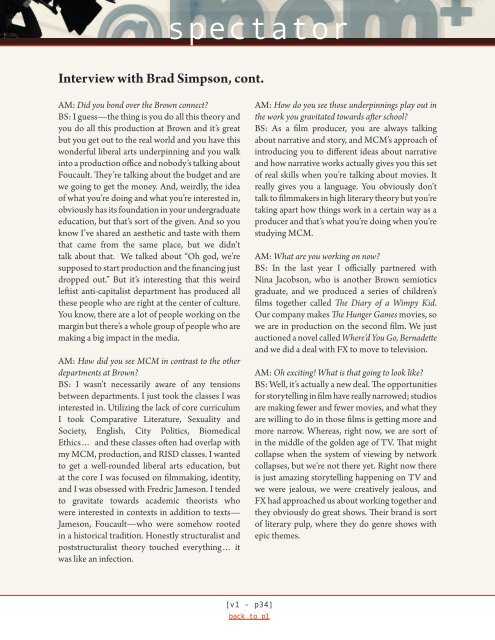You also want an ePaper? Increase the reach of your titles
YUMPU automatically turns print PDFs into web optimized ePapers that Google loves.
spectator<br />
Interview with Brad Simpson, cont.<br />
AM: Did you bond over the <strong>Brown</strong> connect?<br />
BS: I guess—the thing is you do all this theory and<br />
you do all this production at <strong>Brown</strong> and it’s great<br />
but you get out to the real world and you have this<br />
wonderful liberal arts underpinning and you walk<br />
into a production office and nobody’s talking about<br />
Foucault. They’re talking about the budget and are<br />
we going to get the money. And, weirdly, the idea<br />
of what you’re doing and what you’re interested in,<br />
obviously has its foundation in your undergraduate<br />
education, but that’s sort of the given. And so you<br />
know I’ve shared an aesthetic and taste with them<br />
that came from the same place, but we didn’t<br />
talk about that. We talked about “Oh god, we’re<br />
supposed to start production and the financing just<br />
dropped out.” But it’s interesting that this weird<br />
leftist anti-capitalist department has produced all<br />
these people who are right at the center of culture.<br />
You know, there are a lot of people working on the<br />
margin but there’s a whole group of people who are<br />
making a big impact in the media.<br />
AM: How did you see MCM in contrast to the other<br />
departments at <strong>Brown</strong>?<br />
BS: I wasn’t necessarily aware of any tensions<br />
between departments. I just took the classes I was<br />
interested in. Utilizing the lack of core curriculum<br />
I took Comparative Literature, Sexuality and<br />
Society, English, City Politics, Biomedical<br />
Ethics… and these classes often had overlap with<br />
my MCM, production, and RISD classes. I wanted<br />
to get a well-rounded liberal arts education, but<br />
at the core I was focused on filmmaking, identity,<br />
and I was obsessed with Fredric Jameson. I tended<br />
to gravitate towards academic theorists who<br />
were interested in contexts in addition to texts—<br />
Jameson, Foucault—who were somehow rooted<br />
in a historical tradition. Honestly structuralist and<br />
poststructuralist theory touched everything… it<br />
was like an infection.<br />
AM: How do you see those underpinnings play out in<br />
the work you gravitated towards after school?<br />
BS: As a film producer, you are always talking<br />
about narrative and story, and MCM’s approach of<br />
introducing you to different ideas about narrative<br />
and how narrative works actually gives you this set<br />
of real skills when you’re talking about movies. It<br />
really gives you a language. You obviously don’t<br />
talk to filmmakers in high literary theory but you’re<br />
taking apart how things work in a certain way as a<br />
producer and that’s what you’re doing when you’re<br />
studying MCM.<br />
AM: What are you working on now?<br />
BS: In the last year I officially partnered with<br />
Nina Jacobson, who is another <strong>Brown</strong> semiotics<br />
graduate, and we produced a series of children’s<br />
films together called The Diary of a Wimpy Kid.<br />
Our company makes The Hunger Games movies, so<br />
we are in production on the second film. We just<br />
auctioned a novel called Where’d You Go, Bernadette<br />
and we did a deal with FX to move to television.<br />
AM: Oh exciting! What is that going to look like?<br />
BS: Well, it’s actually a new deal. The opportunities<br />
for storytelling in film have really narrowed; studios<br />
are making fewer and fewer movies, and what they<br />
are willing to do in those films is getting more and<br />
more narrow. Whereas, right now, we are sort of<br />
in the middle of the golden age of TV. That might<br />
collapse when the system of viewing by network<br />
collapses, but we’re not there yet. Right now there<br />
is just amazing storytelling happening on TV and<br />
we were jealous, we were creatively jealous, and<br />
FX had approached us about working together and<br />
they obviously do great shows. Their brand is sort<br />
of literary pulp, where they do genre shows with<br />
epic themes.<br />
[v1 - p34]<br />
back to p1
















